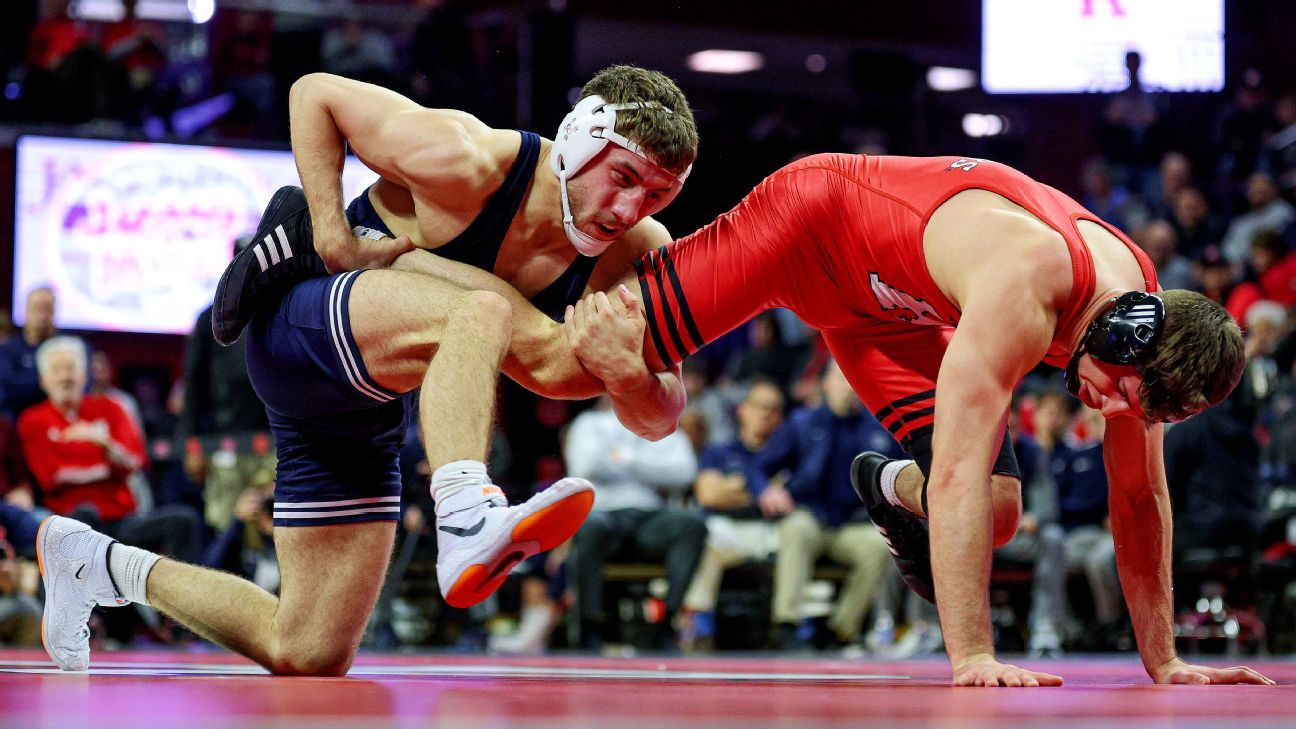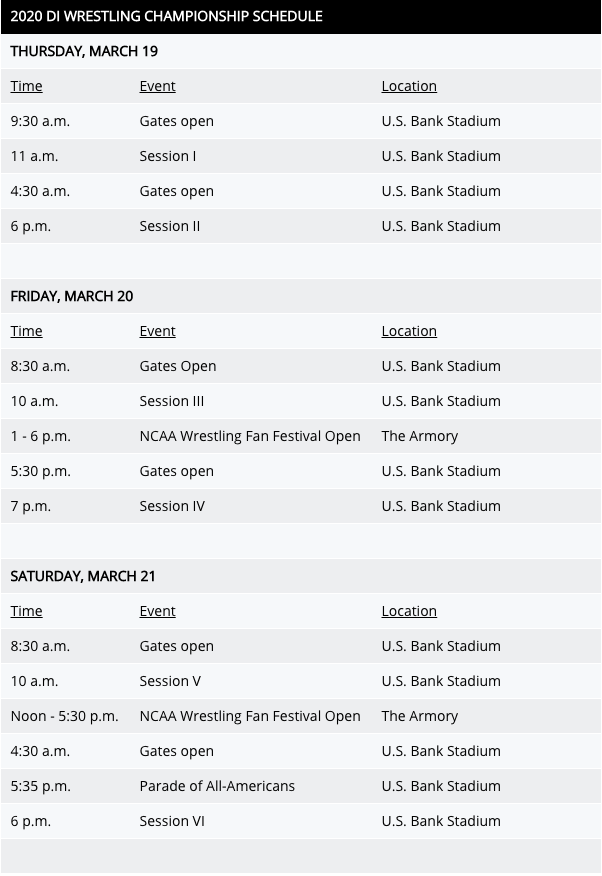Listen up, wrestling fans! The NCAA Wrestling Championships is where dreams are made and legends are born. This ain't just another tournament—it's a spectacle, a celebration of grit, strength, and pure determination. If you're looking to dive deep into the world of NCAA wrestling, you're in the right place. This guide will break it all down for you, from the schedule to the rules, scoring, and even some jaw-dropping stats. So buckle up, because we're about to take you on a wild ride through the heart of collegiate wrestling!
Now, let’s get real for a sec. The NCAA Wrestling Championships isn’t just about watching dudes in singlets throw each other around. It’s a showcase of skill, strategy, and sheer willpower. This event brings together the best college wrestlers in the country, and the competition is fierce. Whether you’re a seasoned fan or a newbie just trying to figure out what the heck a "takedown" is, this guide has got you covered.
Here’s the deal: the NCAA Wrestling Championships is more than just a tournament. It’s a test of endurance, a proving ground for athletes who’ve spent years perfecting their craft. From the opening whistle to the final whistle, every match is packed with tension and excitement. And hey, if you’re wondering how to keep up with all the action, don’t worry—we’ve got all the details you need right here. So let’s get into it!
Read also:Paty Navidad A Star Who Shines Brighter Than Ever
Table of Contents
- NCAA Wrestling Championships Schedule
- The Rules of NCAA Wrestling
- How Scoring Works in NCAA Wrestling
- Key Stats and Records
- A Brief History of NCAA Wrestling
- What It Takes to Compete
- Understanding Wrestling Strategy
- NCAA Wrestling Weight Classes
- Famous Wrestlers in NCAA History
- The Future of NCAA Wrestling
NCAA Wrestling Championships Schedule
Alright, let’s talk about the schedule. The NCAA Wrestling Championships usually go down in March, and it’s a three-day extravaganza filled with non-stop action. Day one kicks off with the preliminary rounds, where wrestlers fight tooth and nail to secure their spot in the next round. It’s like a survival of the fittest, and trust me, it’s intense.
Day two is where the real magic happens. This is when the quarterfinals and semifinals take center stage. The competition heats up as the top wrestlers battle it out for a chance to make the finals. And let’s not forget about the consolation matches—those are just as important for wrestlers aiming to climb the rankings.
Finally, day three is all about the main event. The championship finals are where the true champions are crowned. It’s a moment of glory for the winners and a learning experience for everyone else. And hey, don’t forget about the medal rounds—those matches are just as exciting and full of drama. So mark your calendars and get ready for an unforgettable weekend of wrestling!
The Rules of NCAA Wrestling
Now, let’s break down the rules. NCAA wrestling follows a set of guidelines that ensure fair play and safety for all competitors. First off, matches are divided into three periods, each lasting three minutes. Wrestlers earn points based on specific moves and techniques, and the goal is to outscore your opponent or secure a pin.
Here’s the thing: there are penalties for illegal moves and unsportsmanlike conduct. Wrestlers can get penalized for things like stalling, unnecessary roughness, or even grabbing the opponent’s singlet. It’s all about respecting the rules and maintaining integrity in the sport. And let’s not forget about the weight classes—each wrestler competes in a specific weight category to ensure a level playing field.
How Scoring Works in NCAA Wrestling
Scoring in NCAA wrestling might seem complicated at first, but once you get the hang of it, it’s pretty straightforward. Here’s the lowdown: a takedown is worth two points, an escape is worth one point, and a reversal is worth two points. If a wrestler gains control of their opponent in a specific position, they can earn back points. And let’s not forget about near falls—those can earn anywhere from two to four points depending on how long the opponent is exposed.
Read also:Bulls Vs Suns The Epic Showdown That Keeps Fans On The Edge
Now, here’s the kicker: a pin ends the match immediately. If a wrestler pins their opponent, they win the match right there and then. It’s a game-changer, and it’s one of the most exciting moments in wrestling. So whether you’re keeping score at home or cheering on your favorite athlete, understanding the scoring system is key to enjoying the action.
Key Stats and Records
Let’s talk stats, because numbers don’t lie. The NCAA Wrestling Championships has seen some incredible performances over the years. For instance, the record for the most individual national championships is held by Pat Smith and Cael Sanderson, who each won four titles. And how about this: the most team championships are held by the University of Iowa, with an impressive 25 titles under their belt.
Here’s another fun fact: the highest-scoring match in NCAA history was between Ed Banach and Mark Churella in 1986. The final score was 41-39, and it’s still talked about to this day. Stats like these give us a glimpse into the incredible talent and dedication that goes into this sport. So whether you’re a stats junkie or just appreciate a good story, there’s plenty to marvel at in the world of NCAA wrestling.
A Brief History of NCAA Wrestling
Wrestling has been a part of the NCAA since the early 1900s, and it’s evolved quite a bit over the years. Back in the day, matches were a lot more brutal, and the rules were a lot more relaxed. But as the sport grew in popularity, so did the need for structure and safety. Today, NCAA wrestling is a highly respected sport with a rich history and a bright future.
One of the most significant moments in NCAA wrestling history was the formation of the NCAA Wrestling Championships in 1928. It was a game-changer for the sport, providing a platform for the best wrestlers in the country to showcase their skills. Over the years, the tournament has grown in size and prestige, attracting fans from all over the world.
What It Takes to Compete
Competing in the NCAA Wrestling Championships isn’t just about showing up and wrestling. It’s about years of hard work, dedication, and sacrifice. Wrestlers spend countless hours in the gym, perfecting their technique and building their strength. They also have to maintain a strict diet and training regimen to stay in top shape.
Here’s the thing: wrestling isn’t just a physical sport—it’s mental too. Wrestlers have to be mentally tough, able to handle pressure and adversity. They have to be strategic, thinking several moves ahead and anticipating their opponent’s actions. And let’s not forget about the mental toll it takes—wrestling can be grueling, both physically and emotionally.
Understanding Wrestling Strategy
Strategy is everything in wrestling. Wrestlers have to be smart about how they approach each match. They have to know their strengths and weaknesses, as well as their opponent’s. Some wrestlers rely on speed and agility, while others use strength and power to dominate their opponents.
Here’s a tip: don’t underestimate the importance of positioning. Wrestlers have to be strategic about where they place their hands and feet, ensuring they maintain control and avoid giving up points. And hey, don’t forget about the mental game—psyching out your opponent can be just as effective as a physical move. So whether you’re a wrestler or just a fan, understanding strategy can enhance your appreciation for the sport.
NCAA Wrestling Weight Classes
Weight classes are a crucial part of NCAA wrestling. They ensure that wrestlers compete against others of similar size and strength, creating a fair and balanced competition. The weight classes range from 125 pounds to 285 pounds, with each class having its own unique challenges and strategies.
Here’s the deal: wrestlers have to weigh in before each match, and they have to meet the weight requirements for their class. This means they have to carefully manage their diet and hydration levels, ensuring they’re in the right weight range without sacrificing performance. It’s a delicate balance, and it takes a lot of discipline and dedication to pull it off.
Famous Wrestlers in NCAA History
Let’s talk about some of the legends of NCAA wrestling. Guys like Dan Gable, who won a gold medal at the 1972 Olympics and later became one of the most successful coaches in NCAA history. Or how about Pat Smith and Cael Sanderson, who each won four individual national championships? These guys are the stuff of wrestling folklore, and their accomplishments continue to inspire wrestlers today.
And let’s not forget about the current crop of stars. Guys like Zain Retherford and Bo Nickal have made a name for themselves in recent years, showcasing incredible skill and determination on the mat. Whether you’re a fan of the old-school legends or the new-school stars, there’s plenty to admire in the world of NCAA wrestling.
The Future of NCAA Wrestling
The future looks bright for NCAA wrestling. With more and more schools adding wrestling programs and investing in the sport, the level of competition is only going to increase. And with advancements in technology and training methods, we can expect to see even more incredible performances in the years to come.
Here’s the thing: wrestling isn’t just about winning championships—it’s about building character and instilling values like hard work, discipline, and perseverance. These are lessons that wrestlers carry with them long after they’ve hung up their singlets. So whether you’re a fan, a competitor, or just someone who appreciates a good story, the future of NCAA wrestling is something to look forward to.
Kesimpulan
And there you have it, folks—the ultimate guide to the NCAA Wrestling Championships. From the schedule to the rules, scoring, and stats, we’ve covered it all. This event is more than just a tournament—it’s a celebration of the sport and the athletes who dedicate their lives to it. So whether you’re a die-hard fan or just getting into wrestling, there’s something for everyone to enjoy.
Now, here’s what I want you to do: leave a comment below and let me know what you think. Are you a wrestling enthusiast? Or are you new to the sport and looking to learn more? Either way, I’d love to hear from you. And hey, if you found this article helpful, why not share it with your friends? Let’s spread the love for NCAA wrestling and keep the conversation going!


